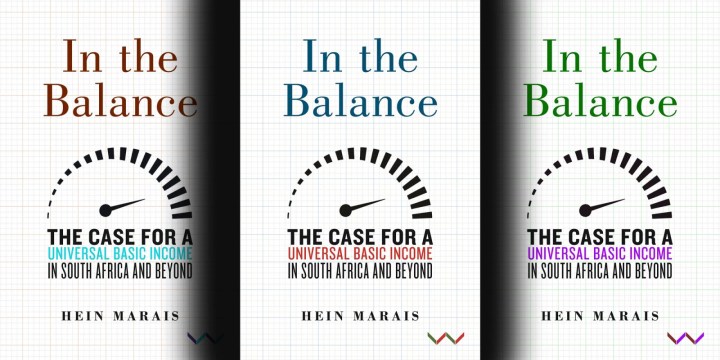SOCIAL SECURITY
Universal basic income for SA trumps basic income grant — author Hein Marais

Evidence indicates that a UBI can reduce poverty and improve people’s physical and mental health, as well as their educational status.
Author and researcher Hein Marais recently launched a book titled, In the Balance: The case for a universal basic income in South Africa and beyond. The book makes the case for a universal basic income (UBI) and explains why — in a country with massive unemployment and inequality — it is the best way to lift people out of grinding poverty.
In an interview with Maverick Citizen, Marais says what he is advocating is different from a basic income grant (BIG). He says a BIG and a UBI are very different interventions which should not be confused.
“A UBI is not a grant,” he emphasises. He says it’s a government programme in which every adult citizen between the ages of 18 and 60 receives a set amount of money regularly, regardless of their financial status, but which does not replace other social entitlements.
About the pandemic’s impact on South Africa’s grant system, Marais says: “Covid exacerbated a number of things that are often overlooked, which is the sheer inequality of our society in all its horror, but it pointed out two other very important things that I think we tend to overlook when trying to understand the social crisis in South Africa. This is the mistaken idea that, by working, everybody can earn a wage that is sufficient for them to live a dignified life.”
According to Marais, South Africa is at odds with the assumption that “having a job is your passport to a life free of want and effectively full of good prospects … we have to start coming to terms with (the fact) that the social crisis we experience — if we are among the lowest income quintile — is not an aberration… is not temporary, and it’s not to be solved by simply carrying on with the kind of economic and social policies that we ascribe to and that we believe that someday will yield fruit. There’s no reasonable basis to assume they will.”
Marais said it was necessary to think of fresh ways for South Africans “to live a life that is free of humiliation, anxiety, panic and desperation… and we cannot rely on wage work to do that”.
He says we shouldn’t think of a UBI as a concession which people ask for because of the “extraordinary circumstances that they find themselves in — we should be thinking about it as their just dues.
“I would argue that it’s even more than a right… there is a basis in our Constitution to flesh out this right that would lead to a universal basic income being something that we can say is rightfully ours… a payment that is owed to everyone in society; that the wealth society produces and generates is not something produced by individuals, and that wealth is in fact a common wealth to which we are, in some small measure — and UBI is a small measure — entitled to.
A solid claim
“Colonialism, apartheid and the history of ongoing inequality post apartheid puts that claim for just dues on a very solid footing.”
Marais hastens to add that he does not see UBI as reparations, but as a contemporary claim to what is being produced “right now” and which should be seen as a “dividend” rather than being strictly based on what happened in the past.
Asked how he thinks those in positions of power and privilege can be brought to the table and buy into a UBI, Marais says: “This is where the UBI reveals its political nature… we tend to think of a UBI as a social policy tool, a technical fix that we can introduce to reduce poverty and achieve a number of other desirable outcomes.
“What happens when we think of a UBI not just as a policy fix, but as an element of a broader set of changes required to try to change our society into a more just and egalitarian one?
“The reality is that there are contesting interests. If we want to finance a UBI, we will have to change some of our economic policies — review and reform our fiscal and macroeconomic policies — and see how we put those at the service of society rather than the service of the accumulation of capital.”
‘In the Balance’: The book
In the first chapter of his book, Marais broadly defines a UBI as “a universal and regular (monthly) cash payment to individuals, without conditionalities (such as work requirements or enrolling children in school), means-testing or targeting”.
He explains that different proponents of the UBI differ on the details of what this means. The growing calls for a UBI followed the 2008 global financial crisis and resultant social activism that exposed “widening income, wealth and social inequalities of a decades-long trend of falling real wages (especially for low and middle income workers) and of the extraordinary accumulation of income and wealth by the top 1% of earners”.
The second chapter deals with what Marais calls “the crisis of wage work”, which shows that wages have remained stagnant, unemployment is on the rise and people are experiencing less job security globally.
Visit Daily Maverick’s home page for more news, analysis and investigations
Covid has exacerbated this, with research from the International Labour Organisation showing that, in the first nine months of the pandemic, workers collectively lost earnings amounting to $3.7-trillion, equating to a staggering 225 million full-time jobs.
The chapter gives a rather gloomy outlook on the chances of bouncing back: “There are indications that capitalism’s resilience — its ability to renew itself through crisis — is waning, with the system steadily eviscerating the economic, social, political and ecological conditions needed for its continued growth.”
Speaking specifically of South Africa, Marais says the working-age population exceeds the “needs of the economy”, contributing to our unemployment and poverty crisis.
Good effects of a UBI
In the third chapter, Marais explains what makes a UBI an attractive option.
“The available evidence indicates that a UBI can have a wide range of desirable effects, including reductions in the depth and extent of poverty and improvements in people’s physical and mental health and their educational status.”
Marais argues that a UBI would mean recognising that access to opportunities is often beyond an individual’s control, which makes the case for redistribution in a systematic way.
Chapter Four starts by looking at why a Basic Income Grant never took off in South Africa when it was first proposed in the early 2000s in bilateral discussions between the government and trade unions. At the time it was pitched at a meagre R100 a month, with financial projections saying that it “could close the poverty gap by 74% and lift about six million above a poverty line of R400 per month”. However, there were fears in government circles about it causing “welfare dependence”.
This leads to chapters five and six, dealing with the contentious issue of how a UBI can be financed and the politics and economics that inform this.
“Ultimately, the design of our social and fiscal policy is geared at ensuring that — as much as possible — it’s the corporations and business sector that have their needs satisfied before the rest of society has its dues and its entitlement satisfied,” says Marais. DM/MC




















 Become an Insider
Become an Insider
Comments - Please login in order to comment.